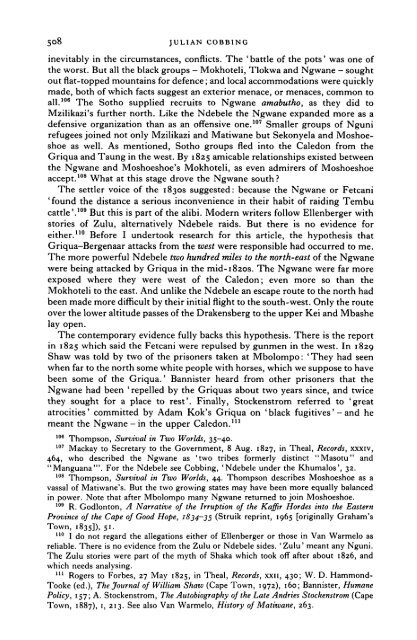The Mfecane as Alibi: Thoughts on Dithakong and Mbolompo
The Mfecane as Alibi: Thoughts on Dithakong and Mbolompo
The Mfecane as Alibi: Thoughts on Dithakong and Mbolompo
You also want an ePaper? Increase the reach of your titles
YUMPU automatically turns print PDFs into web optimized ePapers that Google loves.
508 JULIAN COBBING<br />
inevitably in the circumstances, c<strong>on</strong>flicts. <str<strong>on</strong>g>The</str<strong>on</strong>g> 'battle of the pots' w<str<strong>on</strong>g>as</str<strong>on</strong>g> <strong>on</strong>e of<br />
the worst. But all the black groups - Mokhoteli, Tlokwa <strong>and</strong> Ngwane - sought<br />
out flat-topped mountains for defence; <strong>and</strong> local accommodati<strong>on</strong>s were quickly<br />
made, both of which facts suggest an exterior menace, or menaces, comm<strong>on</strong> to<br />
all. 106 <str<strong>on</strong>g>The</str<strong>on</strong>g> Sotho supplied recruits to Ngwane amabutho, <str<strong>on</strong>g>as</str<strong>on</strong>g> they did to<br />
Mzilikazi's further north. Like the Ndebele the Ngwane exp<strong>and</strong>ed more <str<strong>on</strong>g>as</str<strong>on</strong>g> a<br />
defensive organizati<strong>on</strong> than <str<strong>on</strong>g>as</str<strong>on</strong>g> an offensive <strong>on</strong>e. 107 Smaller groups of Nguni<br />
refugees joined not <strong>on</strong>ly Mzilikazi <strong>and</strong> Matiwane but Sek<strong>on</strong>yela <strong>and</strong> Moshoeshoe<br />
<str<strong>on</strong>g>as</str<strong>on</strong>g> well. As menti<strong>on</strong>ed, Sotho groups fled into the Caled<strong>on</strong> from the<br />
Griqua <strong>and</strong> Taung in the west. By 1825 amicable relati<strong>on</strong>ships existed between<br />
the Ngwane <strong>and</strong> Moshoeshoe's Mokhoteli, <str<strong>on</strong>g>as</str<strong>on</strong>g> even admirers of Moshoeshoe<br />
accept. 108 What at this stage drove the Ngwane south?<br />
<str<strong>on</strong>g>The</str<strong>on</strong>g> settler voice of the 1830s suggested: because the Ngwane or Fetcani<br />
' found the distance a serious inc<strong>on</strong>venience in their habit of raiding Tembu<br />
cattle'. 109 But this is part of the alibi. Modern writers follow Ellenberger with<br />
stories of Zulu, alternatively Ndebele raids. But there is no evidence for<br />
either. 110 Before I undertook research for this article, the hypothesis that<br />
Griqua-Bergenaar attacks from the west were resp<strong>on</strong>sible had occurred to me.<br />
<str<strong>on</strong>g>The</str<strong>on</strong>g> more powerful Ndebele two hundred miles to the north-e<str<strong>on</strong>g>as</str<strong>on</strong>g>t of the Ngwane<br />
were being attacked by Griqua in the mid-1820s. <str<strong>on</strong>g>The</str<strong>on</strong>g> Ngwane were far more<br />
exposed where they were west of the Caled<strong>on</strong>; even more so than the<br />
Mokhoteli to the e<str<strong>on</strong>g>as</str<strong>on</strong>g>t. And unlike the Ndebele an escape route to the north had<br />
been made more difficult by their initial flight to the south-west. Only the route<br />
over the lower altitude p<str<strong>on</strong>g>as</str<strong>on</strong>g>ses of the Drakensberg to the upper Kei <strong>and</strong> Mb<str<strong>on</strong>g>as</str<strong>on</strong>g>he<br />
lay open.<br />
<str<strong>on</strong>g>The</str<strong>on</strong>g> c<strong>on</strong>temporary evidence fully backs this hypothesis. <str<strong>on</strong>g>The</str<strong>on</strong>g>re is the report<br />
in 1825 which said the Fetcani were repulsed by gunmen in the west. In 1829<br />
Shaw w<str<strong>on</strong>g>as</str<strong>on</strong>g> told by two of the pris<strong>on</strong>ers taken at <strong>Mbolompo</strong>: ' <str<strong>on</strong>g>The</str<strong>on</strong>g>y had seen<br />
when far to the north some white people with horses, which we suppose to have<br />
been some of the Griqua.' Bannister heard from other pris<strong>on</strong>ers that the<br />
Ngwane had been 'repelled by the Griqu<str<strong>on</strong>g>as</str<strong>on</strong>g> about two years since, <strong>and</strong> twice<br />
they sought for a place to rest'. Finally, Stockenstrom referred to 'great<br />
atrocities' committed by Adam Kok's Griqua <strong>on</strong> ' black fugitives' - <strong>and</strong> he<br />
meant the Ngwane - in the upper Caled<strong>on</strong>. 111<br />
106 Thomps<strong>on</strong>, Survival in Two Worlds, 35-40.<br />
107 Mackay to Secretary to the Government, 8 Aug. 1827, in <str<strong>on</strong>g>The</str<strong>on</strong>g>al, Records, xxxiv,<br />
464, who described the Ngwane <str<strong>on</strong>g>as</str<strong>on</strong>g> 'two tribes formerly distinct "M<str<strong>on</strong>g>as</str<strong>on</strong>g>otu" <strong>and</strong><br />
"Manguana"'. For the Ndebele see Cobbing, 'Ndebele under the Khumalos', 32.<br />
108 Thomps<strong>on</strong>, Survival in Two Worlds, 44. Thomps<strong>on</strong> describes Moshoeshoe <str<strong>on</strong>g>as</str<strong>on</strong>g> a<br />
v<str<strong>on</strong>g>as</str<strong>on</strong>g>sal of Matiwane's. But the two growing states may have been more equally balanced<br />
in power. Note that after <strong>Mbolompo</strong> many Ngwane returned to join Moshoeshoe.<br />
109 R. Godl<strong>on</strong>t<strong>on</strong>, A Narrative of the Irrupti<strong>on</strong> of the Kaffir Hordes into the E<str<strong>on</strong>g>as</str<strong>on</strong>g>tern<br />
Province of the Cape of Good Hope, 1834-35 (Struik reprint, 1965 [originally Graham's<br />
Town, 1835]), 51.<br />
110 I do not regard the allegati<strong>on</strong>s either of Ellenberger or those in Van Warmelo <str<strong>on</strong>g>as</str<strong>on</strong>g><br />
reliable. <str<strong>on</strong>g>The</str<strong>on</strong>g>re is no evidence from the Zulu or Ndebele sides. 'Zulu' meant any Nguni.<br />
<str<strong>on</strong>g>The</str<strong>on</strong>g> Zulu stories were part of the myth of Shaka which took off after about 1826, <strong>and</strong><br />
which needs analysing.<br />
111 Rogers to Forbes, 27 May 1825, in <str<strong>on</strong>g>The</str<strong>on</strong>g>al, Records, xxn, 430; W. D. Hamm<strong>on</strong>d-<br />
Tooke (ed.), <str<strong>on</strong>g>The</str<strong>on</strong>g> Journal of William Shaw (Cape Town, 1972), 160; Bannister, Humane<br />
Policy, 157; A. Stockenstrom, <str<strong>on</strong>g>The</str<strong>on</strong>g> Autobiography of the Late Andries Stockenstrom (Cape<br />
Town, 1887), 1, 213. See also Van Warmelo, History of Matiwane, 263.

















